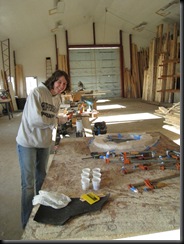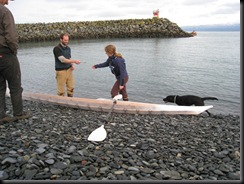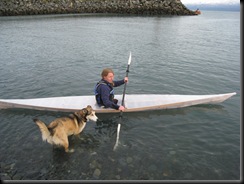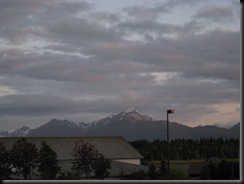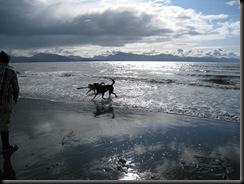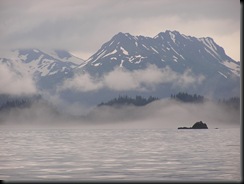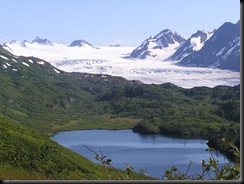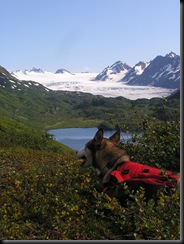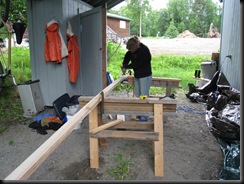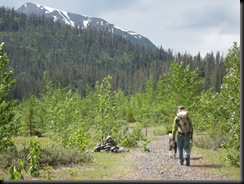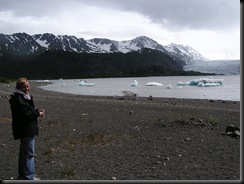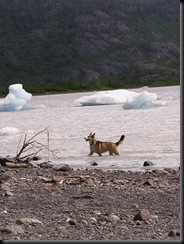I woke up this morning, after a much needed and greatly enjoyed night's sleep, to the sounds of snow plows outside and a veritable winter wonderland. I let the dog out, made a pot of coffee, started a fire, pulled up next to it and settled in to read the Nov/Dec issue of Orion magazine.
I turned to an article by Rebecca Solnit, 'The Most Radical Thing You Can Do', speaking to a conversation that Tim, Megan, and I, and more recently Justine, have been having on and off this fall. The idea, as Tim put forth, of being consumers of experiences and ever needing more - even as we believe so strongly in 'Buy Local' and reduction of emissions and carbon footprints. Not that I hadn't considered my negative global impact as a result of travel, but the extent to which I had thought about it began and ended, more or less, with the raw numbers - how much jet fuel I just contributed to burning etc etc. But the idea the perhaps indeed the most radical thing I can do is to stay home. To invest and experience and live and be in the immediacy and beauty of the land around me. The final paragraph of the article reads,
The word radical comes from the Latin word for root. Perhaps the most radical thing you can do in our time is to start turning over the soil, loosening it up for the crops to settle in, and then stay home to tend them.
Okay, I'm sold. Easy, right?
Not so much as I turn the page to the next article by Bill McKibben, 'Multiplication Saves the Day'. Knut's words ring in my head, excitedly discussing the possibilities and the implications of a multiplier effect - though in that case relating to moose response to increasing abundance of forage resources. McKibben posits that while we all can and should pat ourselves on the backs and continue to fight the good fight of individual responsibility to change - more efficient appliances, buying at the local farmer's markets, taking shorter showers - it is simply not enough. And it's never been enough .. individual decisions need to be cased within a larger context that can ring in the ears of the entire country. He says,
The trick is to take that 5 percent [who are deeply concerned and motivated to act on climate change at an individual level] and make them count for far more than 5 percent. And the trick to that is democracy.
The political mobilization of that 5 percent can ricochet around the nation and drive home federally mandated change - indeed this is how the Civil Rights Act came to be. In McKibben's words:
...the strategy was not to desegregate the country one lunch counter at a time - there were way too many lunch counters. Instead, you use the drama of the fight over one lunch counter to help drive the Civil Rights Act, which puts the full power of the federal government behind the idea...
As I turned yet another page I found myself enveloped in Ginger Strand's article, 'The Crying Indian - How an environmental icon helped sell cans - and sell out environmentalism'. My heart pounded as I read it (and not solely due to all of the coffee) ---
"How can we expect individual choice to right the wrongs of collective decisions?"
The Ad Council worked with Keep America Beautiful to campaign for the awareness and curbing of littering in the 1960s and 70s. Great, except that KAB is founded by the companies that worked so hard to move towards disposable packaging after WWII, given the cost effectiveness of one-way delivering (i.e. no refilling of soda bottles). The very idea that we, as a collective nation, were cajoled into this new way of being - my grandparents and great-grandparents were essentially convinced that to consume and discard is the best way to be a citizen of Our Great Country. From Strand's article this quote from economist Robert Nathan in 1944,
Only if we have large demands can we expect large production. Therefore, it is important that in planning for the postwar period, we give adequate consideration to the need for ever-increasing consumption on the part of our people as one of the prime requisites for prosperity.
How do we contend with such a marketing campaign on such a large scale - the damming of the Columbia to not only provide cheap electric, but to create aluminum plants for the war that then have heaps of product following said war needing a market? The idea that production off of the mass-production assembly line needs to be met by an equally ravenous consumptive energy - how truly and completely the tail wags the dog. We took that road. We have walked this walk for decades now, such that the idea to me of having to market the idea of disposability to the populace kind of blow my mind. In that revelation, however, is a deep vein of hope. We are not necessarily doomed to be hopeless consumers, mired in our individual crosses to bear - 300 pounds per capita annually of solid waste production.
But there again is that question,
How can we expect individual choice to right the wrongs of collective decisions?
I'm going to leave it at that for now, as I have to head into the office for a bit and contemplate other questions concerning citizen's science, water quality monitoring, Kachemak Bay and my place in the organization I have now joined. That thought, though, is well worth contemplation. As a proud member of the 5% McKibben calls forth, how do I move my individual choice into a collective movement, into the fabric of a democracy that has and will see remarkable power towards revolution and change?




